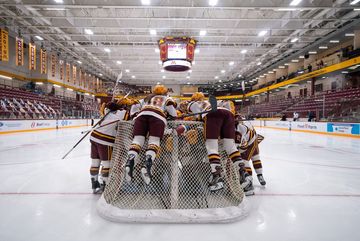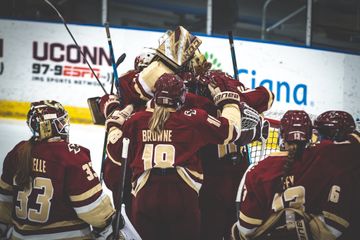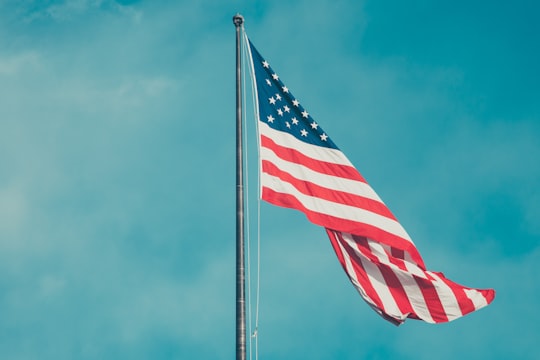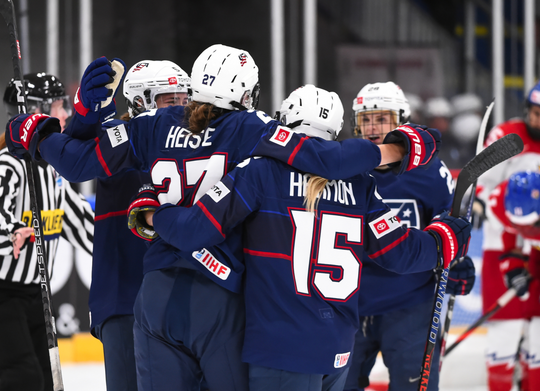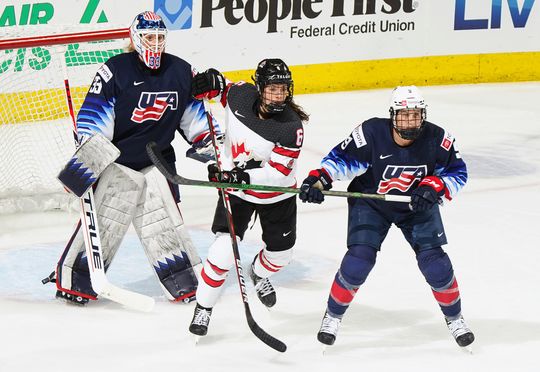Editor's note: In June 2023, it came to our attention that Monique and Jocelyne Lamoureux's official Twitter account, and Monique's personal Instagram account, were spreading transphobic and bigoted content. As a result, we do not recommend purchasing or reading this book. We stand in solidarity with the trans community and believe trans people belong in sports, including elite sports. (source 1, source 2)
Jocelyne Lamoureux-Davidson and Monique Lamoureux-Morando have had an eventful life so far, both on and off the ice. The North Dakota natives helped the famous Shattuck-St. Mary's hockey program to its first ever girls' hockey championship as teenagers, and later played in numerous Olympics with USA Hockey (finally winning gold medals in 2018).
Their forthcoming book Dare to Make History: Chasing a Dream and Fighting for Equity covers that and more. It offers a glance into their upbringing, including their early exposure to the game of hockey via their brothers, their growth through the sport, and how they've transitioned in recent years to also serve as advocates for women's hockey and women in hockey.
The Lamoureuxs were, of course, part of the negotiation group that worked with USA Hockey several years ago to put together a maternity benefits package for professional women's hockey players on the U.S. National Team. Soon after, they also became the first players to take advantage of those benefits, which included full pay, a childcare stipend, and a guaranteed invitation to two national team tryouts.
In the book, Monique and Jocelyne discuss their entrée into motherhood, from returning to training just two weeks postpartum to traveling to a national team program with children (and a nanny) in tow. Readers are then transported back to their early days, when the Lamoureux family was cheering on its matriarch in marathons, crossing borders to visit family in Canada, and skating on a backyard rink.
The Lamoureux family, as with most who reach the highest levels of professional hockey, has had its privileges. But they've also been exposed to some of the harsher realities of life, including flooding and evacuations in 1997 that saw Jocelyne and Monique sent to live with family members in Canada for two months. They also open up about struggles with mental health in their family. The twins detail some tougher times they've dealt with and discuss these matters with vulnerability and authenticity.
Over the course of the book, we learn much about how the Lamoureux family developed their relationships through the sport of hockey; how the twins watched women's hockey in the 1998 Winter Olympics for the first time with eager eyes; how their years at Shattuck-St. Mary's and the University of North Dakota shaped their futures, and how their personal lives intertwined with their careers, too.
As you can guess from the book's title, there's also a significant portion of it that focuses on the U.S. National Team and their fight with USA Hockey for better pay, resources, and benefits. It provides background on how the movement got started back in 2015 and how talks progressed (or didn't) leading up to the 2017 IIHF World Championships. From connecting with lawyers and getting advice from notable women's hockey superstars like Julie Chu, to sitting down with USA Hockey and reaching out to women's hockey players from across the country to encourage them to stand together, it's a detailed behind-the-scenes look at how the movement came together.
For the Lamoureux sisters, their professional hockey careers are now pretty much in the books (no pun intended), but the work is far from over. After failing to make the roster for the 2020 IIHF World Championships team (which didn't end up happening anyways due to the coronavirus pandemic), Monique and Jocelyne have elected to focus on their families and their work in community engagement, including their partnership with Comcast, their charitable foundation, and a determination to continue fighting for gender equity and the future of women's hockey.
I sat down with the sisters (virtually) for a Q&A to learn more about the book and their writing process. This interview has been lightly edited for length and clarity.
Melissa: What made you want to write a book?
Monique: After the 2018 Olympics, multiple people told us we should write a book. Thinking about it, especially the events that transpired between 2015 and 2018, we realized there's definitely a story there, when we think of the particular roles that we played in the gold medal game and the role that we had within our team with our negotiations with USA Hockey. I think we realized, okay, we do have a story, we are definitely going to need help telling that story. Beyond that, with us starting our foundation, we believe there's more to it than just the hockey piece, trying to make a difference and help others and how that all ties into our mission now. I think our story resonates with a lot of people, not just hockey players, not just athletes. We think it's very relatable, so we hope that people don't come away with it thinking it's just a hockey book.
Jocelyne: Our team's story was important to be told. Obviously, our individual story plays a key part into that, but sharing our team's story and to have that be an example for women, to have a voice and to feel empowered and be examples for young girls and young boys. It was really important to us to be able to share that story, and it's always been more than hockey for us, and I think that's why we feel it was important to write a book.
Melissa: Talk me the process of writing a book. How long did it take?
Monique: The first part of it was putting together a book proposal. When you're thinking, hey, we're going to write a book, and tackling it, when you have no words to a page, and thinking of just getting started was one of the challenges.
Jocelyne: How do you pitch it? What are the most important key moments to pitch to try to get a publisher to say "Yeah, we'll print this."
Monique: That was a big challenge. We had a book collaborator that helped us and I think that was huge in getting the skeleton and the bones of the book started. We were extremely involved in the entire writing process; we didn't want any sentence or page to not sound like it was in our voice.
It would have been almost two years ago when we started the book proposal process, and then it took probably a good 16 months from the start of our interview process to writing to when we finally got the ARC digital copy. Almost a little over a year and a half process, so it took a while, and then throw in the pandemic in there, that threw in a little wrench into how we were doing things, but it's quite a process.
Melissa: You talked about the pandemic, but overall, what were the challenges of writing the book while parenting and also doing hockey work and your foundation work?
Jocelyne: To be honest, the pandemic almost was helpful as far as writing. We basically haven't traveled in almost a year, since the end of last February when we went to Philadelphia for the last PWHPA event, which is also when we shot the cover of the book. That was the last time we traveled. And so, prior to that, we were working, we were editing and doing interviews with our collaborator, basically around training, around camp, around travel that we had. To be honest, not having to travel basically was kind of good timing as far as editing goes. But it was also difficult; we had to keep the boys home from daycare for a while, and so trying to get anything done, they were just turning one so not the most stable walkers, so you're kind of following them everywhere. We have a good rotation of, if we're at Monique's and emails need to get answered, Monique would take the boys and I would pump out some emails or we rotate. It was a team effort when they weren't in daycare for sure.
Monique: Yeah, and I think when they were back in daycare, with how we operate, this is the same like in school. We're good for a couple hours and then we need a break, then we'll pump out another couple hours. We can't go all day doing something. We needed a breather in there, so we'd go train and then, if we had to get through a draft, we'd go work for 2-3 hours. When you have a kid, working for two to three hours straight, those are very efficient hours and then we'd get the boys from daycare. And then when they would go to bed, then we would work for another two to three hours after they went to bed and before we went to bed. We had a pretty good system but when they were home from daycare, it was pretty tough to get anything done unless they were napping or in bed.
Melissa: You share some really personal stories in the book. Was it a little scary or intimidating to open up about some of those more vulnerable moments?
Jocelyne: I don't think so because I think we didn't want to paint a picture of, things are perfect for us and we haven't faced any adversity, not just in hockey but in life. People don't want to hear that; they don't want to hear about how easy it is. I think showing your imperfections and being vulnerable and sharing those tougher moments is what's important. I don't want to say it's easy but it was important to us to share those moments because they really impacted us at a young age and have been, not defining moments, but very impactful moments in our lives and so it was important for us to share the real moments. It could have been easier to leave those out, maybe but we want to be real and also be an example because a lot of people go through things, a lot of families have experience with [mental health issues] and our family is no different. And so it was important for us to share that.
Monique: Yeah, I think when we were going through that, figuring out what stories were important for us to tell, that was a story that from the onset, we knew we wanted to talk about. And so, again, it's not easy to talk about but it was something that we knew it was important to share and to make sure we got that story right. Like Joce said, it was huge for us at a young age going through that and having experienced mental health issues within our family. Every family has their issues and it's something that, even though we haven't experienced it, being on the other side of it as a family member, there's so many people that go through that side of it, and I feel like it's a big reason why we are the way we are in certain aspects. We felt it was extremely important to share. When it came to us the flood when we went to school in Canada for two months, we were in first grade at the time. As a first grader, you don't really understand the gravity of everything that's going on but as you get older and realize how fortunate we were to come home to our house, and to go sleep in our beds, when we got home, we're extremely lucky because so many people came home to nothing. That was also an important story we wanted to share as well.
Melissa: Are there any stories or moments that you wish would have made it into the book but didn't?
Jocelyne: I don't think so. During the writing process, you put so much in, and it's like, whoa, this is a lot. We have too many pages here, from a sheer page standpoint. We knew we'd have to cut it down, but I think that's part of the writing process. You put so much down and then you figure out what's important, what adds color, what adds meaning. What's just another story that's not really adding importance to the bigger picture? I don't think there's something that we took out that we felt should be in there, because things that we thought should be in the book, we kept in.
Monique: I think the only thing was what we went through going into the 2018 Olympics. There was a lot that not just us but our entire team went through and I think if we wanted to write a book on that, we could probably write a book solely about that entire 2017-2018 season. It's figuring out what's important to tell to get the point across, but then also being able move throughout the story without belaboring the point. At a point you're putting so much in, you're cutting out and then that's where you ask, that's where your editors come in to help because some things that we might think are extremely interesting, editors are like no, readers aren't going to care about that, but we want more from this story so give us more from here. That's where the editors were extremely helpful.
Melissa: If there's one thing that people can take away from reading your book, what do you hope that people will take away from reading it?
Jocelyne: I think what's important is no matter what you do in life, no matter what types of dreams or goals you have, the most important part of the journey when you look back is how you treated people and how you impact those around you. We're fortunate to have a platform where we can impact lots of people because of our hockey careers. What a shame if you don't take advantage of that to do good in the world. But it doesn't matter what you're doing, what dreams you're chasing, you have small opportunities -- maybe sometimes big opportunities -- to make a positive impact on the people around you. And ultimately what matters in life.
Monique: I think there's the obvious things, like with us being moms and coming back and showing that you can have a career and you can be a mom and you can do it all. Obviously the athlete part of it and just us coming from a small town and having dreams to go to the Olympics and be Olympic champions. I think there's that part of it, but I think the bigger part of the story is everything that Jocelyne just said, along the way. We always tell people, your teammates will never remember how many goals you scored and how many assists you have in the stats. People remember how you treated them. And I think back to everything that Jocelyne said if you can, along your journey, make a positive impact and make a difference and be a positive influence on others, that's truly what matters at the end of the day.
Melissa: To cap things off, what are you up to these days?
Jocelyne: We're obviously excited for the book to come out. It's such a long process to get from the book proposal to this point, and so we're really excited to have people read it and to hear what people's thoughts are. Obviously, Monique is due in two months, right? (At the time of this interview, Monique was expecting her second child.)
Monique: Yep, eight weeks and counting down the days.
Jocelyne: We've been doing a lot more work with our foundation, so we're excited about the spring and some things that we have in the works to be making a difference for kids in North Dakota. That's been something that because of COVID and the time we have without traveling, has been something that we've been able to put more into and something we're excited about.
Monique: Because of COVID and the time we've had at home, it's really allowed us to really put a lot more energy and focus into our foundation and what we want to do and goals we have moving forward. We've really just been flying by the seat of our pants when it comes to what we've been doing with that, so it's allowed us to really dig our teeth into our foundation work. As an athlete, you're inherently selfish with everything that you're doing as far as performance and training and everything that revolves around that, but when you become a mom and the work we're doing with our foundation, you realize that it's not about you. It's refreshing in a way to be able to put our focus and energy into other things; it's been a nice change for us.
Monique and Jocelyne officially announced their retirements from the U.S. National Team on February 9, 2021. Their book, Dare to Make History: Chasing a Dream and Fighting for Equity, is out February 23 from Radius Book Group.

